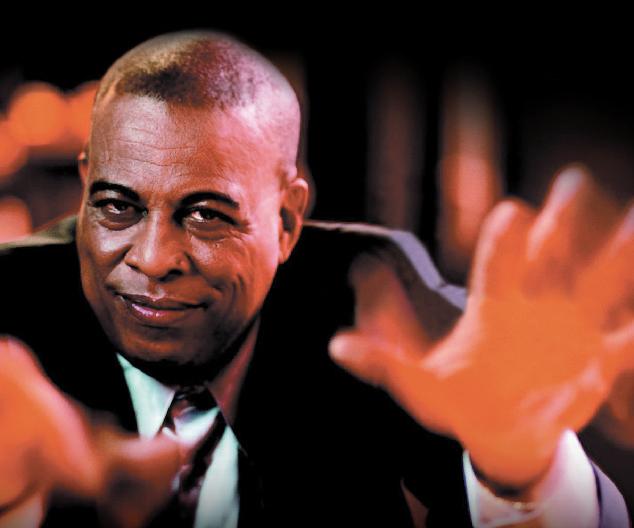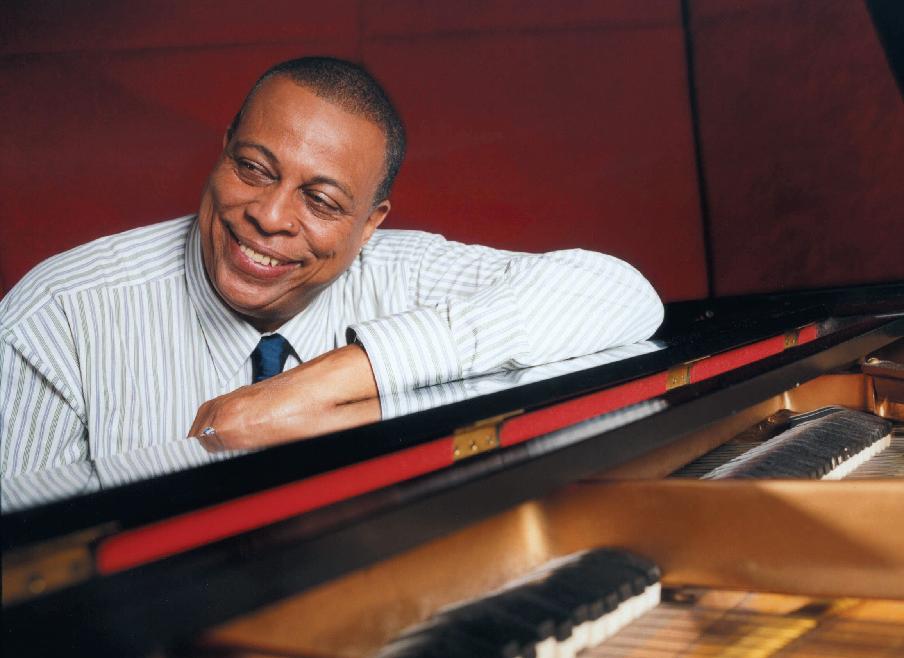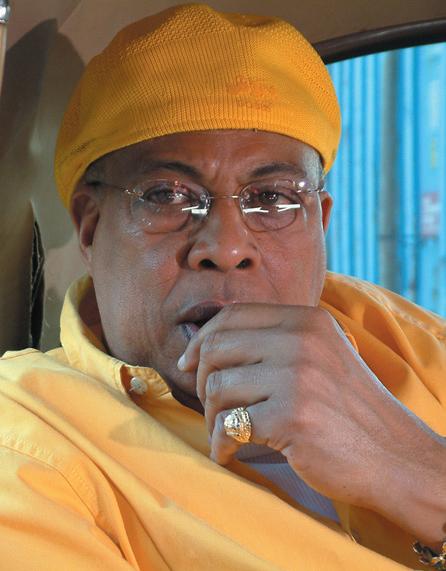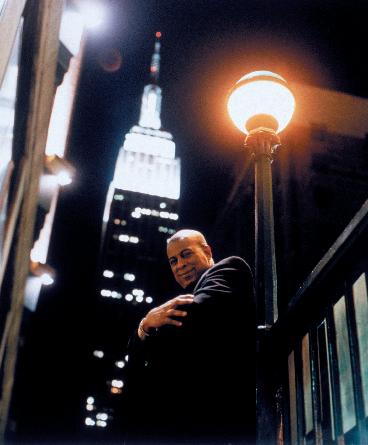

Chucho Valdés Quartet
曹楚.包爾德斯 四重奏 16 -17.3.2007

演出者 Musicians
Chucho Valdés: Latin Jazz thoughts from the Master 7 11 16 20
香港文化中心音樂廳
Concert Hall
Hong Kong Cultural Centre
演出長約1 小時30 分鐘, 不設中場休息
Running time: approximately 1 hour and 30 minutes with no interval
曹楚.包爾德斯 Chucho Valdés
古巴爵士樂與曹楚.包爾德斯 Cuban Jazz and Chucho Valdés
曹楚.包爾德斯專訪
為了讓大家對這次演出留下美好印 象,請切記在節目開始前關掉手錶、 無㵟電話及傳呼機的響鬧裝置。會場 內請勿擅自攝影、錄音或錄影,亦不 可飲食和吸煙,多謝合作。
To make this performance a pleasant experience for the artists and other members of the audience, PLEASE switch off your alarm watches, MOBILE PHONES and PAGERS. Eating and drinking, unauthorised photography and audio or video recording are forbidden in the auditorium. Thank you for your cooperation.

樂手 Musicians
鋼琴 Piano
曹楚.包爾德斯 Chucho Valdés
低音大提琴 Bass
拉撒羅.里維羅.阿拉康 Lázaro Rivero Alarcón
鼓 Drums
胡安.卡洛斯.羅亞斯.卡斯特羅 Juan Carlos Rojas Castro
敲擊樂 Percussion
亞羅地.艾布.羅布斯 Yaroldy Abreu Robles
Sat
歡迎觀眾演出後留步,與曹楚.包爾德斯見面。
If you would like to meet Chucho Valdés, please stay behind in the auditorium after the performance. 演後藝人談 Meet-the-Artist (Post-Performance) 17.3.2007
本節目音響器材由通利琴行贊助
The audio equipment is sponsored by

Chucho Valdés

曹
楚.包爾德斯是古巴傳奇鋼琴家貝寶. 包爾德斯之子。曹楚自幼是音樂神童, 三歲起學習彈鋼琴,五歲正式受業於奧 斯卡.穆尼奧斯.博法蒂格門下。八歲起師從塞 奈達.羅梅烏、羅薩里奧.佛朗哥及萊奧.布 華。 15 歲自組三人爵士樂隊。
1970 年,曹楚於波蘭的爵士狂歡節首次亮相國 際舞台,同輩出色的爵士鋼琴家戴夫.布魯貝 克對他大為讚賞。曹楚於 1973 年回國時成立的 爵士樂團「叢林樂團」,被譽為二十世紀下半葉 古巴音樂史上最重要的爵士樂隊。該樂團於 1980 年憑同名唱片《叢林》贏得格林美最佳拉丁 錄音獎。
The son of legendary Cuban pianist Bebo Valdés, Chucho Valdés was a child music prodigy. He learned to play the piano at three years old, and received formal training at the age of five under the supervision of Professor Oscar Muñoz Boufartique. From age eight he studied with Zenaida Romeu, Rosario Franco and Leo Brower, and by 15 he had formed his own jazz trio.
1996 年曹楚.包爾德斯聯合年輕樂手 羅伊.哈格羅夫以及來自波多黎各、古
巴和美國的樂師,一起成立了新樂團 「熔爐」。1998 年包爾德斯與他們憑大 碟《夏灣拿》奪得第二個格林美獎項。同
年,他成立了四重奏,與叢林樂隊不 同,後者是以鋼琴領奏。此四重奏共灌 錄了四張專輯,全獲格林美獎提名,兩 張更奪得獎項。連同他本人的獨奏唱 碟,曹楚目前已擁有五個格林美獎及十 四項提名。
曹楚獲獎甚多,包括:古巴國家音樂大 獎、菲利克斯、巴雷拉古巴文化榮譽獎 章、加拿大與夏灣拿高等藝術學院頒發 之榮譽博士學位;名列於拉丁美洲爵士 名人堂,與之並排的有蒂托.普思特、 艾迪.帕爾米里和拉洛.希里。
跟曹楚合作過的音樂大師有赫比.漢考 克、布蘭福德和溫頓.馬塞拉斯、狄 西.格里士比、卡路斯.桑塔拿、米雪 兒.勒格朗、比利.泰勒、肯尼.巴朗 與凱.巴比里等。他不斷與世界各地音 樂家合作,互相擦出火花、包括奇諾. 杜明格斯、馬里安.馬帕蘭、馬爾格 魯.米勒、約翰.路易士、戚.哥利 亞、貢薩洛.盧巴卡巴、喬.洛瓦諾、
小格羅弗.華盛頓、休.弗雷澤、大 衛.桑切斯、喬治.本森、泰姬.馬哈 爾、馬克斯.羅奇、傑克.德約翰尼 特、朗.卡特、伊德里斯.馬哈默德、 高美斯、喬凡尼.諾布林和蒂托.布里 奇。
曹楚已巡迴五十多個國家,他一生努力 開拓,灌錄了超過 52 張專輯。現正籌 備灌錄其歌劇作品《奧巴塔拉》。
At Valdés’s international debut in the Jazz Festival Jamboree in Poland in 1970, he was highly acclaimed by his contemporary Dave Brubeck, the finest jazz pianist of the day. Back home in 1973, Valdés founded his own jazz band, Irakere, considered the most important jazz group in the history of Cuban music in the second half of the 20th century. They won the Grammy Award for Best Latin Recording in 1980 with the album Irakere
In 1996 Chucho Valdés joined the young musician Roy Hargrove and musicians from Puerto Rica, Cuba and the US to form a new band, Crisol. Valdés earned his second Grammy Award with them on the recording Havana in 1998. In the same year, he founded a quartet with a different concept, where the piano carries the singing. The quartet recorded four albums all of which were nominated for Grammys, where two of them were awarded. Together with his solo albums Valdés has received five Grammy Awards and 14 nominations.
Valdés is also the recipient of many other awards and honours including the National Music Prize of Cuba; the Félix Varela Medal of distinction in Cuban culture; honorary doctorates from Canada and the Upper Institute of Arts in Havana; and he has been included in the Latin American Jazz Hall of Fame alongside Tito Puente, Edie Palmieri and Lalo Schirin.
Chucho Valdés has performed with music greats Herbie Hancock, Branford and Winton Marsalis, Dizzy Gillespie, Carlos Santana, Michel Legrand, Billy Taylor, Kenny Barron and Cat Barbieri, to name a few. He continues to work with and engage musicians worldwide including Chino Dominguez, Marian Marpartlan, Mulgrew Miller, John Lewis, Chick Korea, Gonzalo Rubalcaba, Joe Lovano, Grover Washington Jr, Hugh Fraser, David Sanchez, George Benson, Taj Mahal, Max Roach, Jack Dejonnette, Ron Carter, Idris Muhamed, Gómez, Giovanni Noble and Tito Bridge.
中譯:昌明
Valdés has toured to more than 50 countries and made over 52 albums in his trailblazing career. The project he is currently working on is the preparation for the recording for his opera Obatalá
Cuban Jazz and Chucho Valdés 古巴爵士樂 與 曹楚.包爾德斯
文:穆萬諾
對今天許多爵士樂迷來說,古巴爵士 樂就等同於曹楚.包爾德斯。他是古 巴的偉大鋼琴家、樂團領奏及作曲 家;通過驚人的音樂演奏,無形中成 了古巴的親善大使。
古巴爵士樂在古巴幾乎跟美國爵士樂 一樣源遠流長,它融匯了美國爵士樂 和古巴黑人流行音樂和祭儀音樂,是 種種混合音樂中最駁雜的一種,其發 展可上溯至十九世紀九十年代,當時 新奧爾良出現了很多古巴樂師。在這 文化多元發展的港口,古巴音樂和古 巴舞蹈(如哈巴內拉舞)有助形成早期 爵士樂節奏豐富的風格;此外, 1898 年西班牙跟美國之戰役結束,美國佔 領了古巴之後,投資者、專業人士和 旅客大舉湧到古巴,同時帶來了生氣 勃勃的早期爵士樂。
古巴和美國樂師於1920 至1930 年代經 常攜手演奏,在這之前有一首倫巴舞 曲《花生小販》極為轟動,在美國走紅 了 10 年。古巴和美國的音樂風格於四 十年代繼續互相激盪,一方面是古巴 樂師,如馬里奧.包薩、切諾.波索 和貝寶.包爾德斯,另一方面是美國 好手如艾靈頓公爵、史丹.坎頓、迪 茲.吉里斯皮等人。這些音樂交流催 生了古巴波普,這是古巴黑人的曼波 音樂和紐約四十年代早期美國波普音 樂的融合實驗,當時有個馬切圖樂 團,在曼克頓第 52 街的康加俱樂部演 奏這種特別的混合風格。
by Manolete Mora
For many jazz lovers today, Cuban jazz is synonymous with the name of Chucho (Jesús) Valdés. One of Cuba’s greatest pianists, bandleaders and composers, he may be regarded as a goodwill envoy for Cuba through the performance of his breathtaking music.
Cuban jazz has a long history in Cuba, nearly as long as the history of American jazz. A mix of American jazz and Afro-Cuban popular and ritual music, it is one of the most hybrids of all hybrids and its development goes back to the strong presence of Cuban musicians in New Orleans in the last decades of the 19th century. In the multi-cultural port, Cuban music and dance forms like the habanera helped shape the rhythmic grooves of early jazz. Moreover, after the US occupied Cuba at the end of the 1898 Spanish-American War, investors, professionals and tourists flowed into Cuba and along with them the exhilarating sounds of early jazz.
Cuban and American musicians played alongside each other throughout the 1920s and the 1930s in the wake of the roaring success of The Peanut Vendor, a rumba or son composition that remained a big hit for a decade in the US. Cuban and American musical styles continued to cross-fertilise throughout the 1940s with musical exchanges developing between Cubans and Americans, like Mario Bauza, Chano Pozo and Bebo Valdés, on the one hand, and Duke Ellington, Stan Kenton and Dizzy Gillespie, on the other. These exchanges led to the emergence of Cubop, a particular hybrid style that derived from the experimental blending of Afro-Cuban mambo and American bebop in New York in the early 1940s by members of the Machito Orchestra who were playing at the La Conga Clublocated on 52nd Street in Manhattan.
這些在美國出現的音樂 探索,使古巴人對爵士 的興趣更加濃厚。
1940 年代,美國黑手 黨成員常在國際知名的 夏灣拿「熱帶俱樂部」開 派對。曹楚的父親貝 寶.包爾德斯就在俱樂 部跟樂隊領奏艾曼度. 羅繆一起切磋,發掘爵 士和古巴音樂的各種混 合風格。約 10 年後, 古巴發生革命,令古巴 與美國斷絕所有關係, 卡斯特羅政府認為爵士樂是典型的美 國貨色,自然加以禁止。許多樂手離 開了古巴,以前兩國樂師和音樂的自 由交流也幾乎停滯。

儘管如此,革命結束後,古巴仍然有 爵士樂的演奏,特別是在即興舞曲的 聚會或即興合奏的場合。年輕的曹楚 正是在這時期領導他首個爵士三人 組,並寫下《曼波影響》,成了夏灣拿 的流行樂曲。
1967 年,政府支持成立一個現代音樂 樂團:古巴現代音樂樂團,令古巴爵 士樂再次進入全盛期,也培育了最出 色的古巴音樂天才,如帕克圖.迪里 費拉、艾圖路.桑杜包和曹楚.包爾 德斯。這些著名樂手的興起並非偶 然,而是數十年來古巴活潑的爵士傳 統及音樂實驗所產生的結果。
原文足本首刊於2006年《閱藝》。
穆萬諾 於香港大學教授民族音樂學, 亦演奏古巴音樂及峇里島的嘉美蘭音 樂。 © Jimmy Katz / Blue Note
These explorations in the US further ignited Cuban interest in jazz. At the internationally famed Tropicana Club in Havana in the 1940s, where members of the American mafia often partied, Chucho’s father, Bebo Valdés, began working with bandleader Armando Romeu to explore various blends of jazz and Cuban music. The Cuban Revolution a decade or so later led to a rupture in all kinds of relations with the US, and jazz, which was perceived as quintessentially American by the Castro government, was consequently discouraged. Many musicians left Cuba, and the previous flow of musicians and music between Cuba and the US almost came to a standstill.
Nevertheless, jazz continued to be played in Cuba in the aftermath of the Revolution, particularly through the descarga gatherings or jam sessions. It was during this time that the young Chucho Valdés led his first jazz trio and wrote the tune Mambo Influenciado, which became a standard in Havana. In 1967 the government supported the formation of a modern music ensemble, the Orquesta Cuban de Musica Moderna, which stimulated a new efflorescence of Cuban jazz and the nurturing of the most extraordinary of Cuban musical talents, such as Paquito D’Rivera, Arturo Sandoval and Chucho Valdés. The rise of such notable musicians was not an accident but rather the result of a lively, decade’s long tradition of jazz and musical experimentation in Cuba.
This is an excerpt of the original article published in the 2006 FestMag.
Manolete Mora teaches ethno-musicology at the University of Hong Kong and performs both Cubanbased music and Balinese gamelan music.
曹楚.包爾德斯 專訪
我從未踏足過香港,我只是從其他的音樂人口中得悉這是一個很有 趣的城市,這况有一群很棒的樂迷。到香港是我的夢想之一。
曹楚.包爾德斯
當
我越洋專訪這位現年已屆66 歲(1941 年於古巴奎維肯出生)的古巴爵士樂大師曹楚.包爾德斯, 談及香港時,他熱切地說了上述的話。
包爾德斯琴藝精湛,在古巴爵士界極具代表性。他的父親是很有名氣的 鋼琴手貝寶.包爾德斯, 1960 年投奔自由,在斯德哥爾摩定居,我問他:「提起你的名字,我們總會想起兩個人,一位是你 父親貝寶,他在你鋼琴技巧上是否影響深遠?另一位是 1973 年與你組成叢林樂隊的薩克斯管大師帕 克圖.迪里費拉。」
他說:「我父親對我的演奏引以為傲,他是我的老師,也是我音樂靈感的泉源,我以身為他的兒子為 榮。而柏克圖則是相當平易近人的樂手,也是我至今見到極少數真正能 夠同時演奏古典和爵士音樂 的出色樂手。」
包爾德斯一直受到古巴當地及美國爵士樂迷的尊崇,他在1967 年創立了古巴當代樂團,1973 年又創 立叢林樂隊,至今仍深受世界各地爵士樂迷激賞,我請他談談創立兩個 組合的信念。
受父親樂隊啟蒙
「古巴當代樂團是一所我讀過最好的『學校』,在那况我學習到處理大樂隊的秘技,又學習到如何為大
樂隊創作,以及怎樣成為出色的鋼琴伴奏。其實我最先是從父親的樂團 Sabor de Cuba 中偷師。至 於叢林樂隊,那是我現場演奏的夢想,將純非洲文化、非洲古巴文化透 過爵士樂的融合而成形,並 打破過往形式與結構的一種爵士樂。對我來說,這是我生命中最好的一 隊古巴組合,當中合作過的 樂手阿圖羅.桑多瓦爾、帕克圖.迪里費拉、約基.瓦羅拿和卡洛斯. 艾弗霍夫,也是當世紀最好 的陣容。」
「你推出過的廿多張唱片中,1986 年的《Lucumi》、1991 年的《Solo Piano》、1997 年的《Pianissimo》 及 1998 年的《Bele Bele en La Habana》給我的印象最深,都是驚世傑作,但這四張專輯與你在 21 世紀推出的作品,無論彈奏手法與風格都很不同,為什麼有這些轉變?」我問。
包爾德斯:「我一直都在進步,當下我勤練左手,令左手在控制方面與右手同樣自然,彈奏旋律和歌 曲時同樣純熟。我一直希望演奏富有動感,希望以鋼琴表現非洲敲擊音 樂,但當中仍可找到多位大 師對我的影響,包括艾靈頓公爵、 阿爾特.塔特姆、比爾.伊文斯、麥科伊.泰納及塞西爾.泰 萊。」他沒正面回答我關於他的音樂轉變歷程,卻讓我了解一位大師在音樂路上的「步伐」其實是不斷 轉變的。
彈奏手法 別樹一格
一直覺得,包爾德斯的彈奏方式與手法,與我們一般慣聽的非洲古巴爵 士樂有很大分別,除了保留 拉丁爵士的音樂面貌和節奏,還運用了大量古典技法,令作品別樹一格 ,我常用愉悅、感人、深 刻、熱情、高難度來形容。我禁不住問他是怎樣建立這種風格的;而他 又會怎樣形容自己。
包爾德斯:「我的音樂由不同元素組成,包括非洲古巴音樂、古典、爵士及某些來自世界各地的音樂 元素,樂評人覺得我的演奏很原創和與別不同,可以玩任何形式的音樂 而不會脫離非洲古巴音樂和 爵士音樂,我覺得自己就像一個音樂的創造者,新一代的古巴樂手會在 我的音樂中了解到曹楚.包 爾德斯和叢林樂隊的影響。」
我一直都很想知道,在這位出色的非洲古巴爵士鋼琴家心目中,誰又是 最出色的鋼琴家呢?包爾德 斯答得很精妙:「其實是沒有的,任何一個琴手都可以成為你最欣賞的鋼琴家,因為每一個鋼琴巨匠 都自有一套獨特風格。」我嘗試更具體地問:「你覺得在爵士樂界况,誰是最具代表性的人物?」這次 他的回答很明確:「艾靈頓公爵。」
艾靈頓公爵是美國 Progressive Big Band 和 Orchestral Jazz 的殿堂人物,是美國爵士樂的象徵,那 包爾德斯覺得美國爵士和古巴爵士有什麼相同和不同之處?他說:「它們的不同處在於節奏,兩者的 和聲和旋律其實分別不大,而古巴模式的爵士樂,其即興演奏方式會着 重多元化的旋律與不對稱的 節奏模式。」
望到中國演出
近年爵士樂在中國逐漸流行,他又可有想過到中國這個龐大的市場發展呢?他興奮地說:「這可是好 極了!我很希望能在中國舉行鋼琴獨奏、爵士四重奏、讓叢林樂隊到那 况演出,或者與交響樂團合 作。」
他現在有什麼大計?「現在,我正在實驗一些新的方式,嘗試做一些交響作品,我就稱之為非洲古巴 爵士交響樂吧。」
最後,我問他今次來港演出的部署:「這次來港是一個四重奏,似乎與你以往的演出模式有點不同, 而且成員主要是《New Conceptions》的班底,你會演出這張專輯的作品嗎?」 他答道:「我將會演出一套新的曲目,這些音樂是在《New Conceptions》之後製作的,我們也會演 奏我不同時期最出色的作品。」
馬其發 ,資深樂評人,在香港多份報章雜誌撰寫樂評。
Chucho Valdés: Latin Jazz thoughts from the Master
Is this your first time performing in Hong Kong?
by Ma Kei-fat
Yes. I have never been to Hong Kong before. I have heard from other musicians that there are great audiences here and that is a very interesting city that I am looking forward to exploring. Visiting Hong Kong is one of my dreams come true.
Thinking of you, two people come to mind. The first is your father, Bebo Valdés. Did he influence your piano style?
My father is so proud of my playing. He was my teacher and I am very proud that I am his son because he is always my inspiration.
The second person is Paquito D’Rivera, the saxophone player in the band Irakere, which you formed in 1973. What do you think about Paquito D’Rivera?
Paquito D’Rivera is the most genial musician that I have ever played with in my life, and one of the few that really can play classical and jazz.
You have been highly respected in the jazz field in Cuba and the US for a long time. You formed the Orquesta Cubana de Música Moderna in 1967, then Irakere in 1973 and both are world famous bands. Can you talk about your beliefs and concepts behind these two bands?
The Orquesta Cubana de Música Moderna was the best school that I went to. It was where I really learned the secrets of a big band. I learned to write for big bands and also to be a good accompanying pianist. I started learning first from my father in his big band called Sabor de Cuba. Irakere was my all time living dream. We took the Yoruba culture and Afro-Cuban elements through into jazz, breaking all the accepted forms and structures. For me it was the best Cuban group in history and brought together the best musicians I have ever met in my life Arturo Sandoval, Paquito D’Rivera, Jorge Varona and Carlos Averhoff.
You have released more than 20 albums, and four of your best albums Lucumi (1986), Solo Piano (1991), Pianissimo (1997) and Bele Bele en La Habana (1998) — are to me the greatest albums in the jazz world. However, the styles of these four albums are very different from the albums you have made in the 21st century. Why are they so different?
I am always developing. While I am working with the left hand, I am also giving the same freedom to the right hand. The left hand does melodies and songs well. I am always working on the dynamics
and looking for new African percussion sounds on the piano, but without forgetting the influences of (Duke) Ellington, (Art) Tatum, (Bill) Evans, (McCoy) Tyner and Cecil Taylor.
Your performing style is different from the other Afro-Cuban jazz musicians. Apart from the original Latin jazz style, you have also used classical performing skills that bring a special element to your pieces. I would describe your music as joyful, touching, impressive, enthusiastic and skilful. How do you build up these styles? And, how do you describe yourself?
I include all the elements from my formation as a musician — Afro-Cuban elements, classical, jazz and some other universal musical elements. The critics consider my way of playing very original and different. It is possible to run through all the different styles of music without leaving Afro-Cuban and without leaving jazz. I describe myself as a musical creator. The new generations of Cuban musicians recognise the influence in their work of Chucho Valdés and Irakere.
You are a distinctive and excellent master of Afro-Cuban jazz. So, who do you think is the greatest pianist?
That person doesn’t exist. Anyone can be your favourite piano player, because each of the giants has their own style.
In jazz, who do you think is the most representative person? Duke Ellington.
What do you think is the difference between American and Cuban jazz?
The difference is in the rhythm. The harmonies and melodies don’t make so much difference. The Cuban way of improvisation works with the tumbao standard rhythm for congas, the polyrhythm and the asymmetric.
Jazz music is becoming more and more popular in China in recent years. Are you interested in this large market?
This is a marvellous development and I would like to do a musical production in China. It could be a piano solo, quartet, a reprisal of Irakere or with a symphony orchestra. The possibilities are open ended.
You will perform with a quartet this time. This is different from your past performances on records, and your fellow quartet members are mostly from your New Conceptions album. Does that mean you are going to play music from that album?
I have a new repertory that I would like to play in Hong Kong. This music will be the work developed after New Conceptions , but we will also play a range of the best of music from all my different periods.
Can you talk about your plans for the future?
At this moment I am experimenting and working on a new symphoni c work that is called The Symphonic Sound of the Afro-Cuban Jazz
Ma Kei-fat, writes music reviews for several Hong Kong newspaper and magazines.
